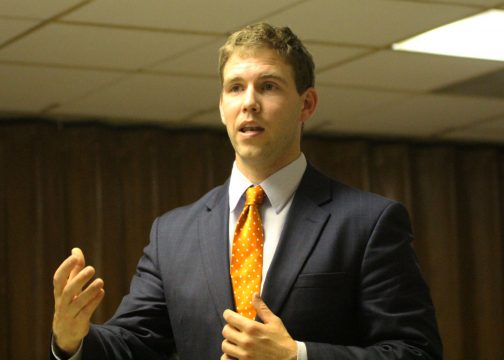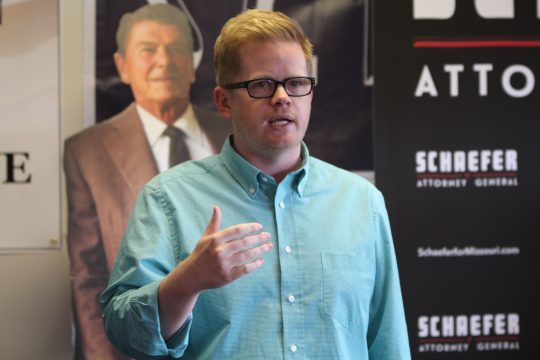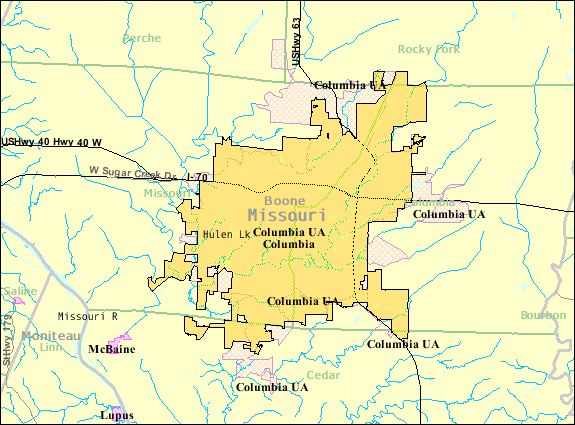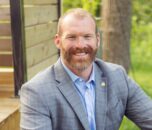COLUMBIA, Mo. – If the state of Missouri had one definitive legislative showdown in 2016’s general election, the race between Stephen Webber, D-Columbia, and Caleb Rowden, R-Columbia, for Sen. Kurt Schaefer’s seat in the upper chamber would be at the top.
Webber has served in the minority and superminority party for eight years with a strong hold on the liberal-leaning 46th District while Rowden has become an influential Republican in a caucus of standouts, although he did not attain leadership positions.
But what really makes this race special is not just that each party has what they believe are some of their strongest candidates statewide. The fight over Webber and Rowden may reveal the underlying consensus on how the Columbia community moves forward after a rough year. The two candidates both have an immense interest in restoring the reputation of one of Missouri’s fastest growing cities, and both make it clear they have nothing but love for the town.
Webber was born in West Virginia but was raised in Columbia since he was three years old, attending Hickman High School and participating in the Boy Scouts.* Rowden was born in Joplin, but he moved to Columbia with his family in 1990. He went to Rock Bridge High, Hickman’s rival.
Coincidentally, Rowden and Webber both graduated in 2001.

After school, their careers went in completely separate directions, though they both went on tours. Webber attended St. Louis University and enlisted in the Marines, serving two tours of duty in Iraq based in Abu Ghraib when the prisoner abuse scandal went public (but long after the abuse occurred) and in Fallujah.
On the other hand, Rowden went on tour nationwide as a Christian musician after just a semester at Mizzou. Roughly five years later, he settled down in Columbia in 2007 to be a pastor at his church, while also starting a media company for small businesses in the area.
“Whatever skills and talents I have… whatever I can do in whatever capacity, I’m going to work my tail off to make this place better for my kids,” Rowden said.
Webber came home in 2008 to attend Mizzou’s law school and begin his political career, which holds special meaning for him.
“What I love about it is when I’m walking through the grocery store and I see former teachers of mine or I’m downtown and some of my friends’ parents that I grew up with… There’s a certain realization that I’m really representing people I know in this community and I’m representing my hometown. That means a lot to me,” Webber said.
Columbia clearly means a lot to both Rowden and Webber, otherwise they would not have come back. Now, voters will decide which of the two would best represent the district, and perhaps who best can remedy its current problems.
Columbia ails from a potent though not necessarily apparent sense of apprehension and unease. The bars still fill up each Thursday, Friday and Saturday night, young families and the elderly walk the footpaths at Stephens Lake Park, and students dutifully go to school at each of the Central Missouri town’s colleges and universities, including the state’s flagship campus.
But the normalcy hides the scars of a year that has brought Columbia and the University of Missouri into sharp focus from the rest of the nation – and not for beneficial reasons. Students of all races, but mainly black students and members of the school’s football team, managed to overthrow former MU System President Tim Wolfe for perceived racial insensitivity and abuse on campus. Graduate students also called to unionize after the administration cut their health care and other benefits just days before classes started. The University of Missouri Hospital was found to be giving admitting privileges to a Planned Parenthood doctor apparently to give the Planned Parenthood clinic the ability to provide abortion services.
It led to threats of budget cuts in the legislature and haranguing from officials, politicians and lay people around the state either shaming the university or shaming those who shamed the university.
Depending on which candidate you ask, the other has not represented the needs of the university or the area well. Webber says the problem does not solely lie with Rowden, but is endemic of all or most of Columbia’s GOP legislators.
“Boone County Republicans go down to Jefferson City and vote one way, then they come home and try to talk like Democrats,” Webber said. “They realize that our values are the ones that are predominant here… and that this is a Democratic county.”
Webber has a point about Boone traditionally being blue. Before Schaefer’s eight-year term, Republicans have only controlled Boone County in the Senate for four years in state history. The university instills a more liberal, progressive and younger population than in many of the surrounding counties.
However, Rowden is quick to note that Columbia does not make up all of the 19th District. The largely Republican Cooper County also makes up the district, and Rowden says he has strong connections with the rural part of the district.
“I think I reflect the diversity and the beliefs of the district as a whole,” Rowden said. “People assume the district is all Columbia, but there’s a big chunk of the rural part of the district. I think being able to find the balance of how you represent rural Missouri and represent the city of Columbia is something I’ve been able to do pretty effectively.”
Rowden also says he better represents Boone for his ability to pass legislation – especially his role in passing ethics reform legislation this past session – and his position as a prominent member of the Republican caucus to accomplish things that even some Republicans could not. And he doesn’t let Webber off lightly for being in the minority party, alleging that Webber simply did not attend session for multiple important votes and failed to be an effective voice for the university when it faced its budget cuts.
“I think it’s at least interesting that neither of the Democrats, including Stephen, drafted an amendment in any form or fashion to restore funding to the University of Missouri. Not one,” Rowden said. “If it wasn’t for me Mizzou would not have gotten what they had gotten this year, plain and simple. [Webber] decided he would rather take a seat on the bench than do anything about it.”
However, some progressive groups have concerns with some of Rowden’s absentee votes, including a walk he took on a controversial personhood bill intended to outlaw abortion that was debated and passed in the last few weeks of session. Laura Swinford, the executive director of Progress Missouri, said the bill was so strict it would have made some forms of fertility treatment illegal.
“We were extremely disappointed that Caleb Rowden showed up that morning, worked, voted on other stuff and when it came time to vote on that personhood amendment, he was nowhere to be found,” Swinford said. “We know he was there and he walked.”
While that may not matter much politically in most of the surrounding area, in Boone County where every countywide elected official is a Democrat, that could raise some eyebrows considering Rowden has voted on the side of the minority party in the past. Most famously, Rowden voted against SJR 39, the “religious liberties” bill, that would have allowed vendors and businesses to opt out of services related to same-sex marriages.
However, some of Rowden’s opponents look at Rowden’s voting record as one favoring political expediency than true representation.
Jack Cardetti, a Columbia-based Democratic political consultant, said that Rowden “voted for years in Jeff City as someone who was trying to run for leadership of the Republican caucus. Which he was. He ended up bowing out of that race. He frankly has not voted his district for years.”
Webber said that Rowden spoke against increased funding for the University when he was running for the House Majority Leader position, and he pointed to Rowden’s switch on paycheck protection as an example. Rowden voted against paycheck protection in 2013 and 2014, but was in favor of it this year. Rowden explained that he changed his vote since it received a digital amendment that would allow for public sector union members to approve of paycheck garnishing in a digital form, rather than needing to submit by some sort of paper method. He says his change of opinion was an “intellectual” one.
“The differences in paycheck from when I voted against it and when I voted for it were pretty significant,” Rowden said.
He also rejected the notion that he did not vote his district.
“I went down there [to Jefferson City] to represent this community,” he said. “I went down there to be as thoughtful and pragmatic as you can and I think I’ve been able to do that.”
Votes for Webber and Rowden are provided and easily available at VoteSmart.org.
Other Republicans speak highly of Rowden as well. Sen. Bob Onder is the author of SJR 39 and a ranking member of the Missouri Senate Republican Campaign Committee. Despite Rowden’s opposition to the bill, Onder says he’s enthusiastic about working to get Rowden in Schaefer’s seat.

“We’re fully committed to the race. It’s a very high priority for us,” Onder said. “Sen. Schaefer’s held the seat for eight years, so we think it’s a seat that’s very winnable by a Republican. We think he’s a strong candidate, and it’s going to be a competitive race. He’s been an outstanding state rep. And we think he’s going to be able to bring home the victory.”
Onder would not say specifically how high of a priority the race would be, but that there is a lot riding on getting another anti-union vote into the Senate. Next year’s GOP caucus in the chamber could include Rep. Anne Zerr, a strong pro-labor vote; Sen. Ryan Silvey, depending on the results of his general election; and Sen. Gary Romine. If Webber gets in along with Zerr and Silvey, issues like right-to-work and paycheck protection would likely never make it through the Senate should a governor veto them.
So far, Onder and the rest of the campaign have realized that contingency and donated $100,000 to Rowden’s campaign. Other senators, including Senate Majority Leader Mike Kehoe and Senate President Pro Tem Ron Richard, have donated $25,000 to Rowden since September.
Even so, Webber has a significant leg up in fundraising. Rowden has raised just under $305,000. Webber raised more than double that amount ($619,000), and not nearly as much of it has been fueled by fellow lawmakers, with a $30,000 donation from Secretary of State Jason Kander being the only exception. Webber had about a six month head start over Rowden, but he believes that his lead is a good indicator that people want change from Schaefer.
“People here in Mid-Missouri are shocked at the extremism of local Republicans,” Webber says. “They’re shocked that local Republicans have so viscerally attacked the University of Missouri when they all campaigned on defending it. They’re shocked local Republicans have choked off health care funds through Medicaid – when they campaigned most of them said they were open to it. They’re shocked that they’ve been so anti-choice when many of them campaigned on it not being a major issue.”
Webber said he has found these people by knocking on doors and speaking at events, but he is most surprised at the number of traditional Republicans “disgusted” by their current representation that have pledged to support him in November. He said people in Columbia did not appreciate the fact that Republican representatives were more interested in “throwing gas on the fire” rather than trying to find solutions.
“That’s why we end up with Republican reps saying they wouldn’t send their dog to the University of Missouri or Republican representatives demanding certain individuals be fired or saying it’s part of the abortion industry, things they would never tell voters when they’re running for office,” Webber said.
If Webber could get even a small chunk of Republican votes to swing his way, that could be enough to put him over the top. However, Jon Ratliff, the former political director for the Missouri House Republican Campaign Committee, is regarded as one of the top young political leaders in the GOP, and he’s in charge of Rowden’s campaign. He notes that the race will be close.
“All Boone County races in general… are always very competitive,” he said. “I think this will be another one where both parties and both candidates are going to work hard.”
Ratliff and the Rowden campaign have done internal polls of the area, but Ratliff has kept mum on the findings. Webber said he had won in that poll and another conducted by the Missouri Scout last fall found Webber with a seven-point lead: 44 to 37. However, that poll was conducted just a few months after Rowden officially entered the race.
The general makeup of the district’s electorate and fundraising totals seem to suggest that Webber has the upper hand going into November, but Rowden’s confident that he can find the votes necessary to keep Schaefer’s seat – possibly the most important seat up for grabs this year – red.
UPDATED – 12:17 p.m., June 13, 2016: A correction was made regarding Webber’s birthplace and upbringing in Columbia. A prior version of this article said Webber was born in Columbia, but he was born in West Virginia.























